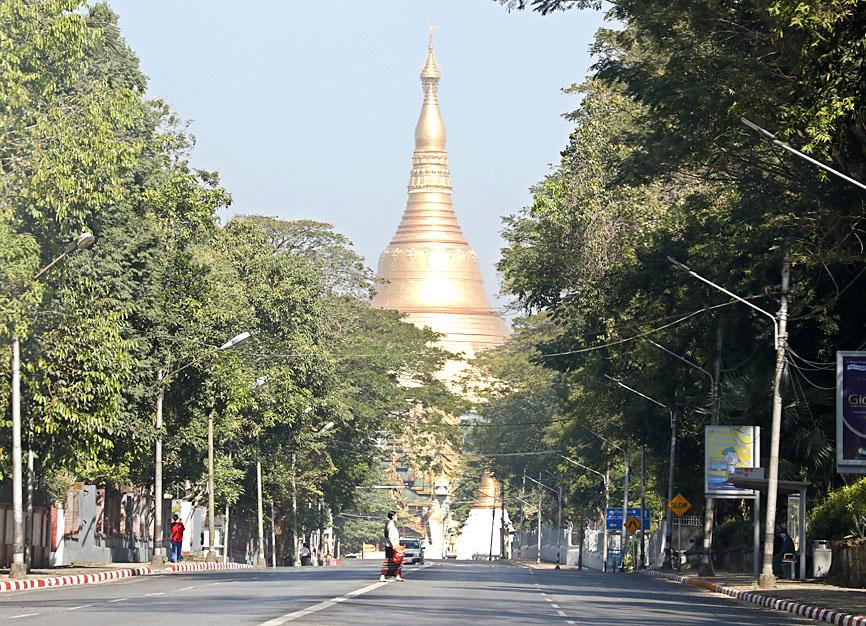Myanmar’s military government plans to establish a digital currency to support domestic payments and boost the economy within the year and is assessing how to move forward, a Burmese State Administration Council spokesman said.
“We are undecided whether we should do it as a joint venture with local companies or by the government alone,” said Major General Zaw Min Tun, who is deputy information minister in the junta that toppled the civilian government a year ago. “A digital currency will help improve financial activities in Myanmar.”
The World Bank estimates that Myanmar’s economy shrank 18 percent in the fiscal year ended in September last year, and forecasts growth of just 1 percent through September.

Photo: EPA-EFE
Myanmar’s economy could have been 30 percent larger without the twin blows of the COVID-19 pandemic and the coup, the international lender said in a report last week.
News of the State Administration Council’s proposal came two months after a group led by supporters of ousted civilian leader Aung San Suu Kyi recognized tether as an “official currency” for use in a fundraising campaign that seeks to topple the military regime.
Aung San Suu Kyi is serving a jail sentence for a slew of charges.
Central banks have been working for years to develop digital currencies, with some planning to deploy them for retail transactions and others opting to restrict them to interbank use. China, whose digital yuan project is among the most advanced, has been developing it since at least 2014.
“We think the country is not in the best position to be able to pursue something like this,” World Bank senior economist for Myanmar Kim Edwards told a news conference last week.
Myanmar would need a good regulatory structure and high capacity within the administration to make it happen, he added.
Burmese central bank currency-management director-general Win Myint said that “at this point, we are still learning about digital currencies and having discussions. We need to consider both pros and cons.”
Myanmar is not the only ailing economy mulling crypto projects. The Venezuelan National Assembly last month accepted for consideration a bill to establish provisions for digital-currency transactions.
Inflation in bolivars has slowed to an annual pace of 53 percent in the past three months, down from well north of 1,000 percent in the past few years, the Bloomberg index showed.

UNCERTAINTY: Innolux activated a stringent supply chain management mechanism, as it did during the COVID-19 pandemic, to ensure optimal inventory levels for customers Flat-panel display makers AUO Corp (友達) and Innolux Corp (群創) yesterday said that about 12 to 20 percent of their display business is at risk of potential US tariffs and that they would relocate production or shipment destinations to mitigate the levies’ effects. US tariffs would have a direct impact of US$200 million on AUO’s revenue, company chairman Paul Peng (彭雙浪) told reporters on the sidelines of the Touch Taiwan trade show in Taipei yesterday. That would make up about 12 percent of the company’s overall revenue. To cope with the tariff uncertainty, AUO plans to allocate its production to manufacturing facilities in

TAKING STOCK: A Taiwanese cookware firm in Vietnam urged customers to assess inventory or place orders early so shipments can reach the US while tariffs are paused Taiwanese businesses in Vietnam are exploring alternatives after the White House imposed a 46 percent import duty on Vietnamese goods, following US President Donald Trump’s announcement of “reciprocal” tariffs on the US’ trading partners. Lo Shih-liang (羅世良), chairman of Brico Industry Co (裕茂工業), a Taiwanese company that manufactures cast iron cookware and stove components in Vietnam, said that more than 40 percent of his business was tied to the US market, describing the constant US policy shifts as an emotional roller coaster. “I work during the day and stay up all night watching the news. I’ve been following US news until 3am

Taiwan will prioritize the development of silicon photonics by taking advantage of its strength in the semiconductor industry to build another shield to protect the local economy, National Development Council (NDC) Minister Paul Liu (劉鏡清) said yesterday. Speaking at a meeting of the legislature’s Economics Committee, Liu said Taiwan already has the artificial intelligence (AI) industry as a shield, after the semiconductor industry, to safeguard the country, and is looking at new unique fields to build more economic shields. While Taiwan will further strengthen its existing shields, over the longer term, the country is determined to focus on such potential segments as

COLLABORATION: Given Taiwan’s key position in global supply chains, the US firm is discussing strategies with local partners and clients to deal with global uncertainties Advanced Micro Devices Inc (AMD) yesterday said it is meeting with local ecosystem partners, including Taiwan Semiconductor Manufacturing Co (TSMC, 台積電), to discuss strategies, including long-term manufacturing, to navigate uncertainties such as US tariffs, as Taiwan occupies an important position in global supply chains. AMD chief executive officer Lisa Su (蘇姿丰) told reporters that Taiwan is an important part of the chip designer’s ecosystem and she is discussing with partners and customers in Taiwan to forge strong collaborations on different areas during this critical period. AMD has just become the first artificial-intelligence (AI) server chip customer of TSMC to utilize its advanced